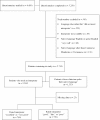Interpreter services, language concordance, and health care quality. Experiences of Asian Americans with limited English proficiency
- PMID: 16307633
- PMCID: PMC1490255
- DOI: 10.1111/j.1525-1497.2005.0223.x
Interpreter services, language concordance, and health care quality. Experiences of Asian Americans with limited English proficiency
Abstract
Background: Patients with limited English proficiency (LEP) have more difficulty communicating with health care providers and are less satisfied with their care than others. Both interpreter- and language-concordant clinicians may help overcome these problems but few studies have compared these approaches.
Objective: To compare self-reported communication and visit ratings for LEP Asian immigrants whose visits involve either a clinic interpreter or a clinician speaking their native language.
Design: Cross-sectional survey-response rate 74%.
Patients: Two thousand seven hundred and fifteen LEP Chinese and Vietnamese immigrant adults who received care at 11 community-based health centers across the U.S.
Measurements: Five self-reported communication measures and overall rating of care.
Results: Patients who used interpreters were more likely than language-concordant patients to report having questions about their care (30.1% vs 20.9%, P<.001) or about mental health (25.3% vs 18.2%, P=.005) they wanted to ask but did not. They did not differ significantly in their response to 3 other communication measures or their likelihood of rating the health care received as "excellent" or "very good" (51.7% vs 50.9%, P=.8). Patients who rated their interpreters highly ("excellent" or "very good") were more likely to rate the health care they received highly (adjusted odds ratio 4.8, 95% confidence interval, 2.3 to 10.1).
Conclusions: Assessments of communication and health care quality for outpatient visits are similar for LEP Asian immigrants who use interpreters and those whose clinicians speak their language. However, interpreter use may compromise certain aspects of communication. The perceived quality of the interpreter is strongly associated with patients' assessments of quality of care overall.
References
-
- Language Use and English-Speaking Ability: 2000. U.S. Census Bureau; 2000.
Publication types
MeSH terms
Grants and funding
LinkOut - more resources
Full Text Sources
Medical
Miscellaneous

